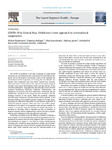COVID-19 in Central Asia: Uzbekistan's new approach to international cooperation
Shadmanov, Alisher
Boklage, Evgeniya
Storozhenko, Oleg
Jansen, Andreas
The COVID-19 pandemic is not only a challenge to public health structures and economies but also a touchstone for international solidarity. Due to the implicit cross-border nature of the outbreak, the international health imperative of “Leaving No One Behind” has become more categorical than ever before. Central Asia, however, still seems to be a white spot on the map of Coronavirus response activities, with sparse international media coverage and few, if any, scientific publications. Geographically and culturally remote, the five countries Kazakhstan, Kirgizstan, Tajikistan, Turkmenistan, and Uzbekistan of ex-Soviet Asia have often been overlooked and are indifferently considered to be among the most repressive and self-isolating countries in the world. While the pandemic ruthlessly unveiled many weaknesses of public health systems globally, it also disclosed hitherto unrecognised positive changes in foreign policy, including new affirmative approaches to international cooperation in COVID-19 outbreak response. With more than 33.5 million people, Uzbekistan is the region's most populous state and one example of a country in transition. Since the election of Shavkat Mirziyoyev as president in December 2016, it signalled not only its intention to improve relations with its neighbouring countries, but also a commitment to open Uzbekistan to the international community.
Files in this item

